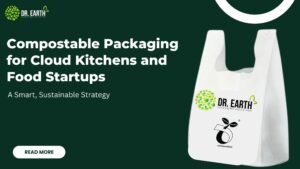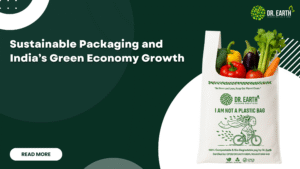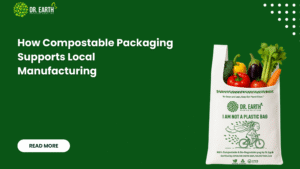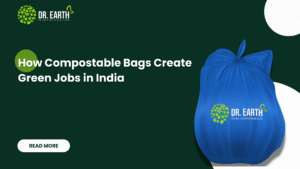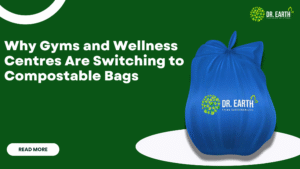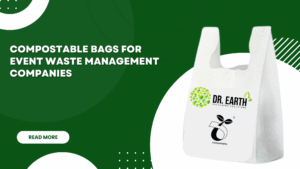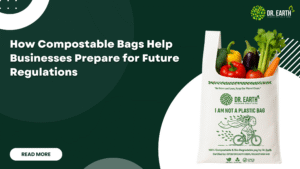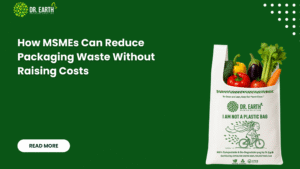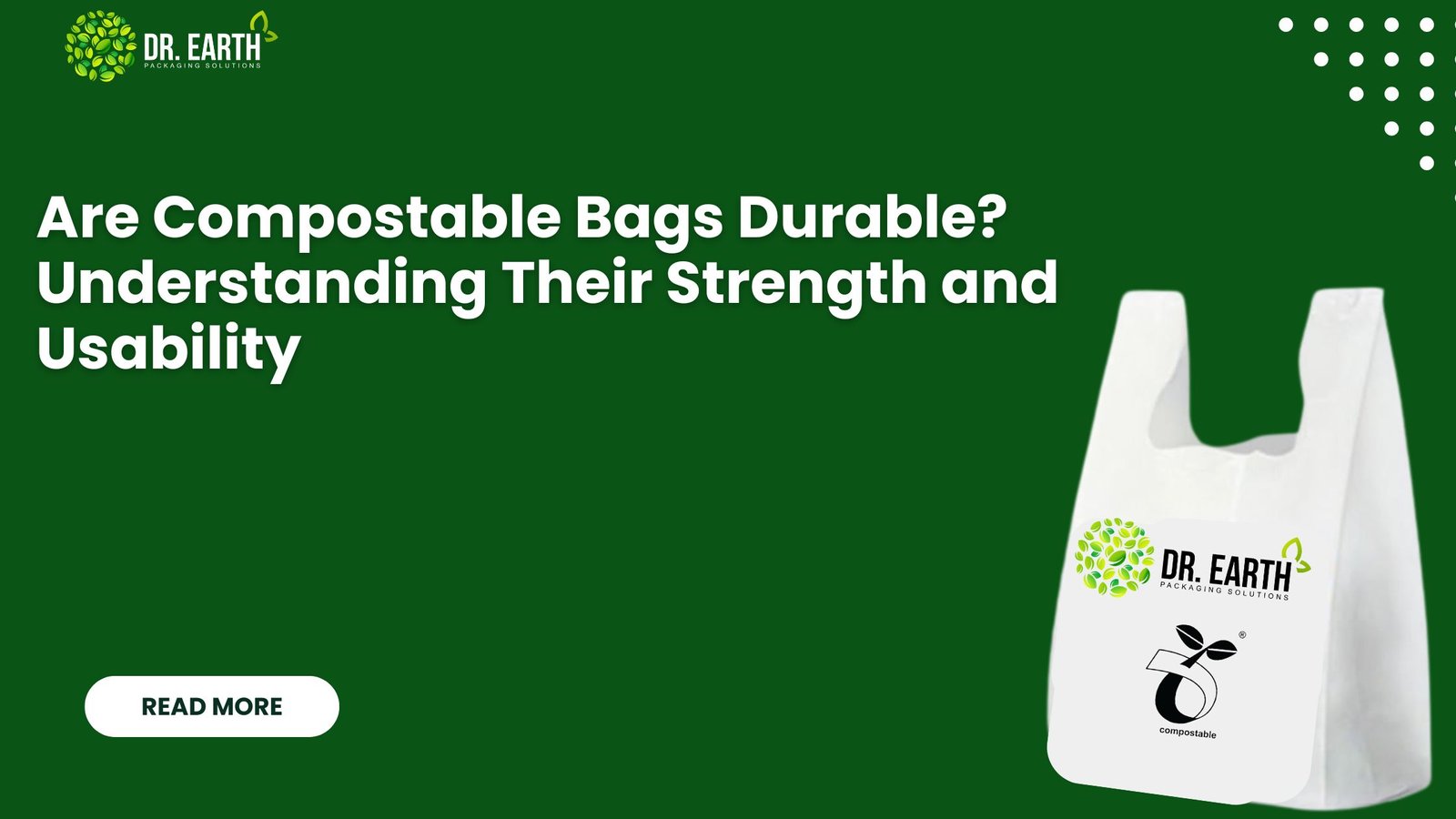
As the world becomes more conscious of environmental sustainability, compostable bags are becoming an attractive option to replace standard plastic bags. They ensure less harm to the environment, but an often-raised question is: Are compostable bags strong enough for long-term use? Both consumers and businesses must learn how compostable bags are compared to plastic bags regarding strength, usability, and usefulness.
In this detailed guide, we will discuss the durability of compostable bags, their advantages, disadvantages, and why they are a superior option for different industries. We will also discuss how Dr Earth, a prominent manufacturer and supplier of compostable bags, is providing quality and durability in their products.
What Are Compostable Bags?
Compost bags are produce from organic materials like cornstarch, PLA (polylactic acid), and PBAT (polybutyrate adipate terephthalate). Compostable bags do not degrade slowly over hundreds of years like normal plastic bags. Compost bags disintegrate into harmless parts when subjected to proper composting conditions.
These bags are made to comply with international compostability standards like ASTM D6400 (USA) and EN 13432 (Europe), which guarantee that they fully decompose within a given time without causing any harm to the environment.
The Strength and Durability of Compostable Bags
One of the largest fears that consumers and businesses have regarding the transition to compostable bags is their strength. Let’s consider their strength based on determining factors:
1. Material Composition
- Compostable bags are made from plant-based materials, which are inherently tough and elastic.
- Dr Earth employs superior bioplastics that make the compostable bags more durable.
2. Tear Resistance
- Compostable bags do not quite live up to the tensile strength of plastic bags, but technological advancements have helped them become considerably more durable.
- They can handle groceries, trash, and even industrial waste without easily ripping when subjected to ordinary use conditions.
3. Moisture Resistance
- Compostable bags will start degrading when they are subjected to a lot of moisture over time, unlike plastic bags.
- Dr Earth’s compost bags are designed to be resistant to moisture for everyday use like food packaging and trash collection.
4. Load-Bearing Capacity
- Compost bags can carry a good load of weight, normally between 5-10 kg, depending on the thickness and quality of manufacture.
- Grocery stores, retail stores, and restaurants that utilize Dr Earth’s compost bags have not experienced any serious breakage or tearing problems.
Benefits of Using Durable Compostable Bags
Shifting to compostable bags has numerous advantages that both the environment and businesses benefit from. These are some of the most notable benefits:
1. Environmental Sustainability
- Decreases plastic pollution and wastage.
- Breaks down naturally into non-harmful residue.
2. Strong and Reliable for Everyday Use
- Will carry groceries, household refuse, and packaging of retail stores.
- Suitable for food delivery services and storage.
3. Compliance with Environmental Regulations
- Plastic bags have been banned or limited in several countries; with compostable options, businesses maintain compliance.
- Dr Earth offers a product that complies with international standards, and companies everywhere prefer it.
4. Customer Satisfaction and Brand Image
- Buyers like to see brands care about sustainability.
- Compostable bags improve the reputation and loyalty of a company.
Industries Benefiting from Durable Compostable Bags
There are a number of industries that use compostable bags as an eco-friendly packaging material. Some of the most important industries helped by their durability are:
1. Retail and Grocery Stores
- Utilized for packaging grocery items, fresh fruits and vegetables, and household essentials.
- Dr. Earth provides compostable shopping bags that are durable and can be reused.
2. Food and Beverage Industry
- Restaurants, cafes, and food delivery chains utilize compostable bags to pack takeout food.
- Prevents plastic usage in food packages.
3. Healthcare and Pharmaceutical Industry
- Compostable waste bags are utilize by clinics and hospitals for the disposal of biomedical and general wastes.
- Provides a sanitary and green waste management system.
4. Hospitality Industry
- Hotels utilize compostable laundry bags and waste bags to limit their carbon footprint.
- Boosts the efforts towards sustainability in the tourism industry.
5. Agricultural Sector
- Utilized to collect and compost organic waste.
- Facilitates effective management of biodegradable waste by farmers.
Challenges of Compostable Bags and How Dr Earth Overcomes Them
Though compostable bags have numerous advantages, there are some challenges to be overcome:
1. Cost Factor
- Compostable bags are a little more costly than plastic bags based on material and manufacturing costs.
- Dr. Earth provides affordable bulk buying options in order to make them more accessible.
2. Proper Disposal
- Customers require education for the proper disposal of compostable bags.
- Dr. Earth offers good labeling and waste disposal information on their packaging.
3. Storage Limitations
- Plastic bags have a longer shelf life compared to bags that are compostable.
- The advanced packaging on Dr Earth maintains their functionality through protection against moisture and heat.
Conclusion: Are Compostable Bags Durable Enough?
The answer is yes—compostable bags are strong enough for all the day-to-day uses such as grocery, food delivery, waste collection, and industrial purposes. With the progression in technology, companies like Dr Earth are working day and night to make them stronger and more usable, and so they prove to be the perfect substitute for plastic bags.
Companies seeking environmentally friendly options can rely on Dr Earth’s compostable bags to provide performance and sustainability. By adopting compostable bags, we help minimize plastic pollution while ensuring functionality in our daily lives.
FAQs
Q- 1. How long do compostable bags last?
Ans- A standard compostable bag has a shelf life of approximately 6-12 months in a cool and dry place. They will start degrading when composting conditions are present.
Q- 2. Can compostable bags hold heavy items?
Ans- Yes! Compostable bags can hold heavy weights. Dr Earth’s bags can hold 5-10 kg based on thickness.
Q- 3. Do compostable bags dissolve in water?
Ans- No! Not immediately, but they do degrade over time when soaked in water for a long time.
Q- 4. Can compostable bags be reused?
Ans- Yes, they can be reused for various purposes, such as storage and waste, before composting.
Q- 5. Where can I buy high-quality compostable bags?
Ans: Dr Earth has a variety of compostable bags available to industries and individuals. They can easily be ordered online through the Dr Earth website — https://drearth.co.in Switching to a compostable bag you can help a planet become greener by reducing plastic waste while maintaining a high durability and use.
Share:
Related Posts
